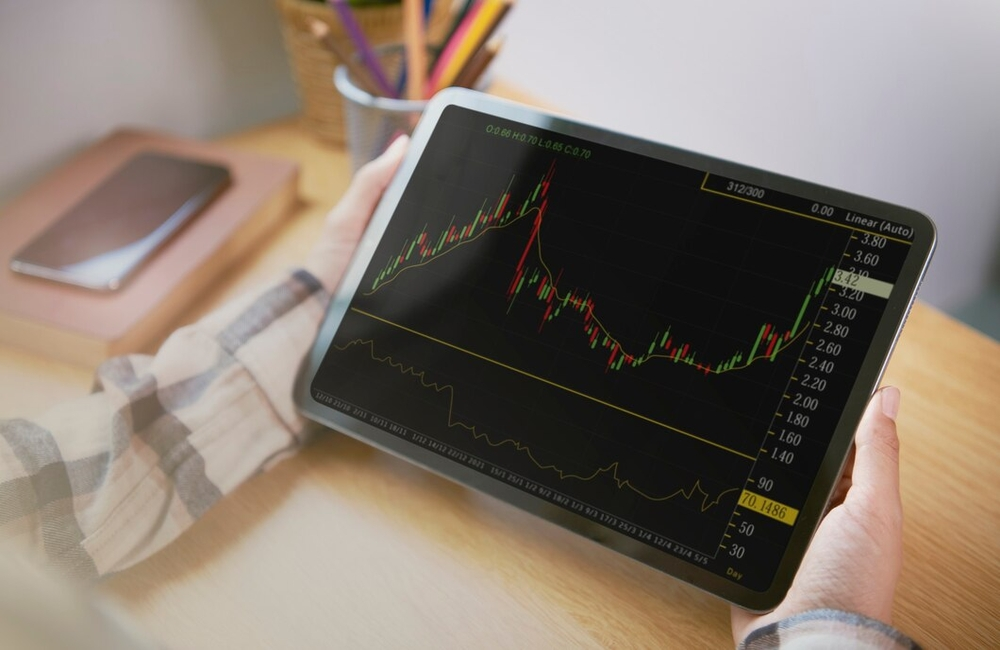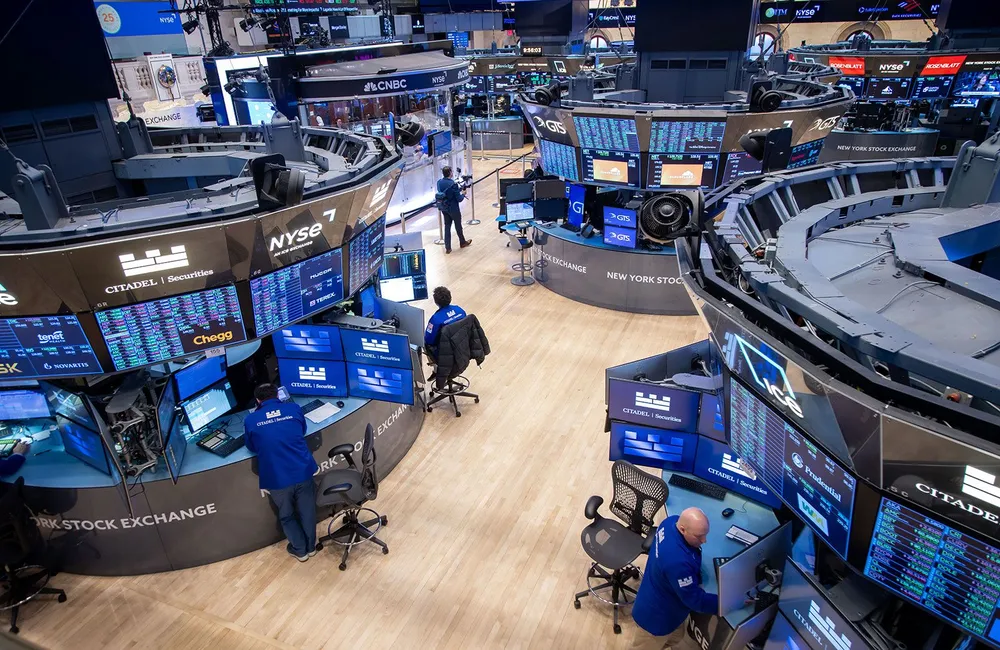ASX futures were 23 points or 0.3% higher at 7100 at 8.00 am on Tuesday, which indicated the day could get off to a good start.
The S&P 500 fell 0.4 percent, reversing small gains in a bout of late-day selling before the closing bell. The technology-focused Nasdaq Composite Index fell 1.2%, dragged lower by declines from Apple, Alphabet and Amazon. The Dow Jones Industrial Average, by contrast, added 26.76 points, or 0.1%, to 32223.42.
The S&P 500, even after rallying Friday, has fallen for six weeks in a row, its longest streak of weekly losses since June 2011. The index has lost 16% so far this year.
Newly released figures revealing a sudden slowdown in Chinese economic activity on Monday highlighted the spreading fear that central banks’ aggressive interest rate increases could push a fragile world economy into recession. Retail sales and industrial production slid more than the markets expected as the country’s brutal zero covid policy takes its toll.
To many issues facing investors such as the Russia-Ukraine war, Federal Reserve policy, inflation, China’s economic slowdown they can’t justify holding any assets too long, said Fawad Razaqzada, market analyst at City Index. Most important, he said, investor confidence has been profoundly damaged by the selloff.
At home, the S&P/ASX 200 finished 0.3% better at 7093.0, as tech stocks continued to rally after a selloff toward the end of last week. Other big gainers included Life360 and Block, which added between 3.4% and 4.4%, and boost the tech sector which added 2.1%. The sector surged nearly 7 percent on Friday after losing 17 percent over the previous five sessions.
The industrials sector, which was 11% higher because of Brambles, was the only stronger performer on Monday (up 2.4%). The pallet maker said that it had been approached about a takeover by CVC Capital Partners.
Banks NAB, ANZ, Commonwealth and Westpac gained between 0.6% and 1.6%.
The overall gains were eroded by weakness in shares of iron-ore miners.
In commodity markets, Brent crude oil was 2.4% higher at US$114.24 a barrel. Iron ore rose 1.3% to US$128.60. Gold was up 0.3% to US$1814.00.
Local bonds were little changed on Monday with the yield on the Australian 2 Year government bond a tick higher at 2.53% while the 10 Year eased to 3.38%. All traded offshore, US Treasury 2 Years fell to 2.57%, the 10 Year to 2.88%.
At 7.16.00am (0336 GMT) on Tuesday, compared with the previous close of 69.38 US cents. The Wall Street Journal Dollar Index which measures the US dollar against 16 other currencies fell to 96.47.
Asia
China stocks finished down as investors absorbed weak April retail sales data, which served as a proxy for the nation’s overall consumption. The measure dropped 11% over the last month, its biggest decline since March 2020. The benchmark Shanghai Composite Index slumped 0.3% to 3,073.75 while the Shenzhen Composite Index dropped 0.3% to 1,926.01. The ChiNext Price Index, which has a heavy weighting of tech shares, dropped the most, falling 1.1% to 2331.23. Consumer goods companies, such as condiment makers and dairy producers, drove the decline. Providers of medical services from Covid-19 testing companies to drug developers added to the drag on the market.
In Hong Kong stocks finished the session in the green, with the benchmark Hang Seng Index up 0.3% to close at 19950.21. Gains led by Chinese property developers, as investors reacted to news reports that three private real-estate companies, Longfor, Country Garden and Midea Real Estate, were approved by regulators to issue bonds onshore as soon as this week. In a note today, analysts at Jefferies said the move could boost investor sentiment in the short term. Country Garden jumped 10% to be the best performing stock on the index, and Longfor rose 4.8%. Midea Real Estate, which is not in the index, rose 7.9%.
In Japan, however, the Nikkei Stock Average ended 0.5% higher at 26547.05, underpinned by continuing expectations of an earnings rebound from the pandemic. Warehouse-equipment manufacturer Daifuku Co. gained 11 percent after it forecasted a 10 percent increase in its fiscal-year net profit. Suntory Beverage & Food gained 5.0% after the company said it aimed to raise prices for nonalcoholic beverages in plastic bottles. Mining stocks were higher, with Nittetsu Mining up 0.9% and Inpex Corp. rising 0.4%.
Europe
European markets opened mixed on Monday after weak Chinese economic data and a lower start in Wall Street.
The pan-European Stoxx Europe 600 fell 0.1%, the French CAC 40 slid 0.5% and the German DAX was down 0.7%.
“Having fallen sharply lower on the back of Chinese retail sales slowing sharply in April, European markets have since rather recovered from the pain” of intraday lows, CMC Markets analyst Michael Hewson says in a note. “Sentiment is cautious as the DAX falls back relatively as it becomes clearer that the Chinese economy is likely to languish in the doldrums for some time yet,” he says.
London’s FTSE 100 defied the downbeat trend in Europe, adding 0.6% after basic resources held up despite weakness in commodity prices and on reports that Abu Dhabi’s Etisalat had bought a 9.8% stake in UK telecoms group Vodafone. Though Etisalat has stated that it has no intention of taking a seat on the board, the move is likely to add to pressure on CEO Nick Read, Michael Hewson, chief market analyst at CMC Markets UK, writes in a research note. In other news, Ryanair said it expects to be profitable in fiscal 2023 and warned of higher fares ahead in the summer period.
North America
US stocks ended mostly lower Monday, deepening the market’s recent selloff.
The S&P 500 dropped 0.4 percent, pulling back from slight gains in a bout of selling ahead of the closing bell. The tech-heavy Nasdaq Composite Index fell 1.2%, hurt by drops in Apple, Alphabet and Amazon. The Dow Jones Industrial Average, by contrast, ticked up 26.76 points, or 0.1%, to 32223.42.
Even after a rally Friday, the S&P 500 has fallen for six straight weeks, its longest weekly losing streak since June 2011. The index has lost 16 percent this year.
Shares of travel and casino companies were among Monday’s biggest decliners. Shares of Expedia Group, Caesars Entertainment and Penn National Gaming all fell more than 5%. The consumer discretionary and technology segments dragged the index lower.
Investors, concerned that the Federal Reserve has been too slow to identify the risks of surging inflation, fear that the central bank will act too boldly to eradicate it a mistake that could push the economy into a recession.
The selloff that has ensued, already exacerbated by the war in Ukraine and Covid-19 lockdowns in China, has been widespread, with many assets from cryptocurrencies and stocks to government bonds feeling the pain and leaving investors guessing where to seek refuge.
After weeks of losses, some investors are clinging to stocks, or buying more of them, betting that declines are nearing their bottom. Others are bracing for a long stretch of volatility.
“We’re entering a more difficult time for markets. You need to see evidence that inflation is not just peaking but really decelerating before you get a sustainable bottom in the market.” That’s going to take a couple of months at least,” said David Donabedian, chief investment officer at CIBC Private Wealth.
“That doesn’t mean we won’t have counter-rallies to the upside from day to day, but I think this is a long, drawn-out process and it is mostly data-driven,” he added.
Investors are dealing with so much the Russia-Ukraine war, Federal Reserve policy, inflation, China’s economic slowdown and it all just makes it hard for them to rationalize holding any assets for too long, said Fawad Razaqzada, market analyst at City Index. At the most basic level, he said, investor confidence has been badly shaken by the selloff.
In after-hours trading, investors were looking for Friday’s rally to push at least a temporary bottom. Several analysts indicated it had.
But in a bigger picture sense, the shifts in monetary policy and pickup in inflation have changed the relationship between stocks and bonds at a fundamental level, said Evercore ISI analyst Julian Emanuel.
Stocks can still rise, he said, but due to rising bond yields, the potential for equities will be “truncated,” not “runaway.”
Among individual stocks, shares of Twitter were down $3.33, or 8.2%, at $37.39 on Monday after Elon Musk said on Saturday that the company’s legal team claimed he had violated a nondisclosure agreement. Mr. Musk said Friday that his $44 billion deal to buy the social-media company was “on hold,” sending shares of the company down almost 10%.
Spirit Airlines leaped $2.29, or 13 percent, to $19.27 after The Wall Street Journal reported that JetBlue Airways intended to make a hostile attempt to acquire the discount carrier. Shares of JetBlue fell 61 cents, or 6.1 percent, to $9.45.
McDonald’s shares fell $1, or 0.4 percent to $244.04 after the company announced it would exit Russia and sell its business there.
In bond markets, yields remained low, with the benchmark 10-year US Treasury note dipping 0.055 percentage point to 2.877% from 2.932% on Friday.
In commodities, US crude oil rose 3.4% to $114.20 a barrel. The national average price of regular gas at the pump in the United States climbed to a peak of $4.48 a gallon, AAA said.
Surprisingly, one signal investors are looking at to determine if we’ve hit a bottom is bitcoin. The cryptocurrency slumped last week in the wake of a collapse in the stablecoin TerraUSD and is down around 35% for the year. But as bitcoin has grown more closely tethered to the broader capital markets, some investors are treating its fluctuations as a barometer of speculative appetite, analysts said.
On Monday, bitcoin ticked down a little bit, but after last week’s carnage, some analysts were reading that as a sign of markets stabilizing. “Stock investors are definitely watching this,” said Barry Bannister, Stifel’s chief equity strategist, of bitcoin’s moves.




















